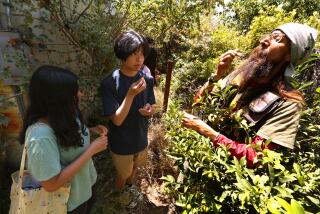Students get global perspective on women’s issues
- Share via
Girls at the Environmental Charter Middle School in Inglewood looked puzzled when Fahmia Al-Fotih described her former days as a teacher in Yemen.
The students weren’t curious so much about the visitor’s hijab or the fact that she had taught more than 70 pupils in a small room. They were surprised that Al-Fotih still used chalkboards and that her female students don’t have much of a voice in school.
Al-Fotih and 19 others from a variety of countries were at the school recently to talk to the girls about topics that concern women around the world. They were part of the U.S. State Department’s International Visitor Leadership Program in which delegates travel around the country examining ways to cultivate leadership in young women in their home communities.
“Yemen is a male-dominated society,” Al-Fotih said. “I am very impressed with the facilities and platforms in place to help [girls] out here.”
Geneva Dowdy’s EmpowHer class at the charter school is one such program. As part of the EmpowHer Institute, the class teaches young women in middle and high school personal, community and financial responsibility and self-reliance. In the class, girls practice what they call “elevator speeches,” which train them to deliver a short resume of who they are in 30 seconds or less, getting them accustomed to public speaking.
Before the visit, Dowdy went over concerns the girls might have had in talking to such a group.
“Some of these girls have ... never met anyone from another country,” she said. “This was a huge opportunity for them and we talked about how we can engage with our guests and make them feel as comfortable as possible while still learning from them.”
The visit allowed them to practice asking appropriate and interesting questions and how to engage in conversation with an older person.
“It shocked the girls how much they were able to get out of the session,” Dowdy said. “I don’t think they realize all the things that we’ve been molding them to be able to do.”
Poised and courteous, Dowdy’s students read poems and told the international delegates about their daily struggles with bullying and “drama.”
“What is drama?” one of the visitors asked, not familiar with the term used outside theatrical expression.
“It’s like when someone talks bad about you behind your back,” a student replied.
Keosha Taylor, 13, told the crowd that before participating in the class, she thought she was “just regular.” Through EmpowHer, she felt more important and special.
“Was you guys,” she started to ask the women before correcting herself. “Are you guys empowered?”
Samaher Abuthaher, who is Palestinian, said it is difficult when women can’t speak freely or stand in front of a group to express themselves.
Sora Duba Dadacha, a head teacher of a nomadic all-girls school in Kenya, told the class that he loses many of his students to forced marriages and many of them have suffered genital mutilation.
“The girls see the school as a rescue center,” he said. “I’m going to educate them so they get empowered like the girls here. I want to take my girls from darkness to light.”
The clock marked the end of the conversation, and much to some of the delegates’ surprise, the group took an impromptu vote for extra time.
The young teenagers all threw a thumbs-up sign in the air, noting their approval of the extension. Dadacha and many of the delegates did the same.
They continued.
A woman from Romania asked how the girls felt about the world’s perception of young women living in Los Angeles based on such television shows as “Hannah Montana” and “Beverly Hills, 90210.”
Many of the teenagers groaned and said the shows were nothing like their lives.
“It makes it seem that we all spend our days at the beach or go crazy shopping,” said Diana Cervantes. “I’d rather not be known as that.”
dalina.castellanos@latimes.com
More to Read
Sign up for Essential California
The most important California stories and recommendations in your inbox every morning.
You may occasionally receive promotional content from the Los Angeles Times.










